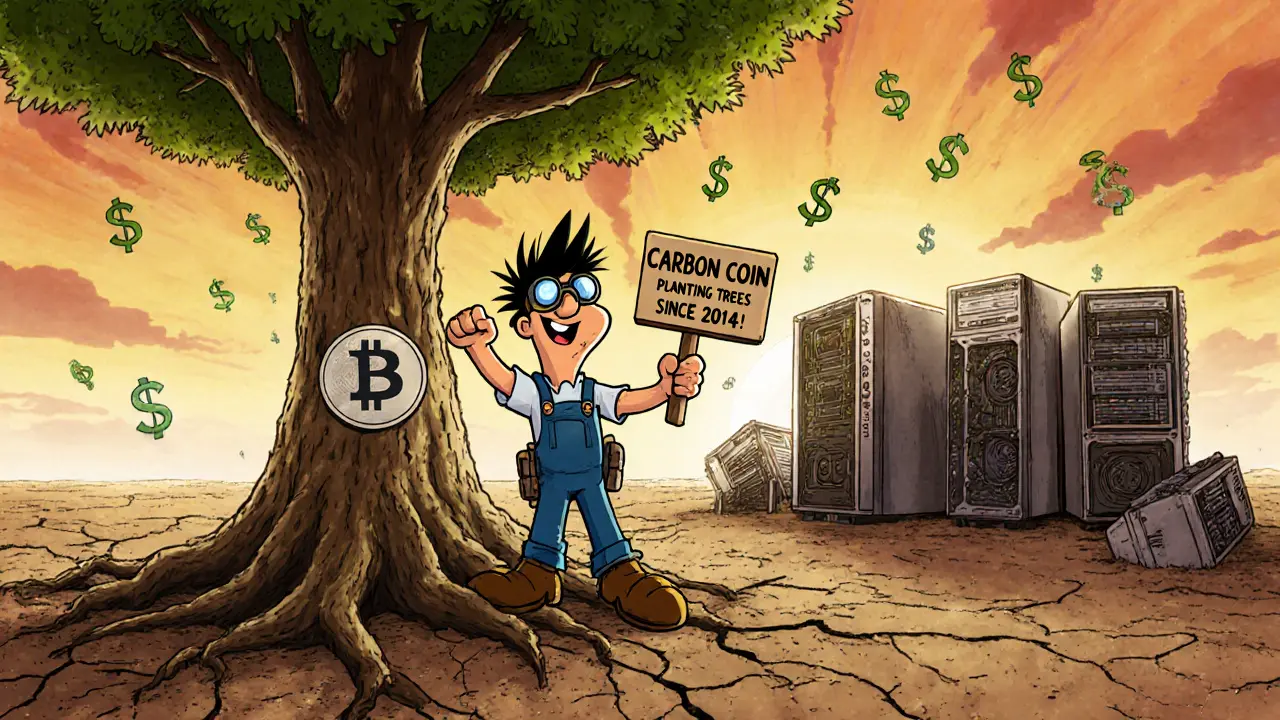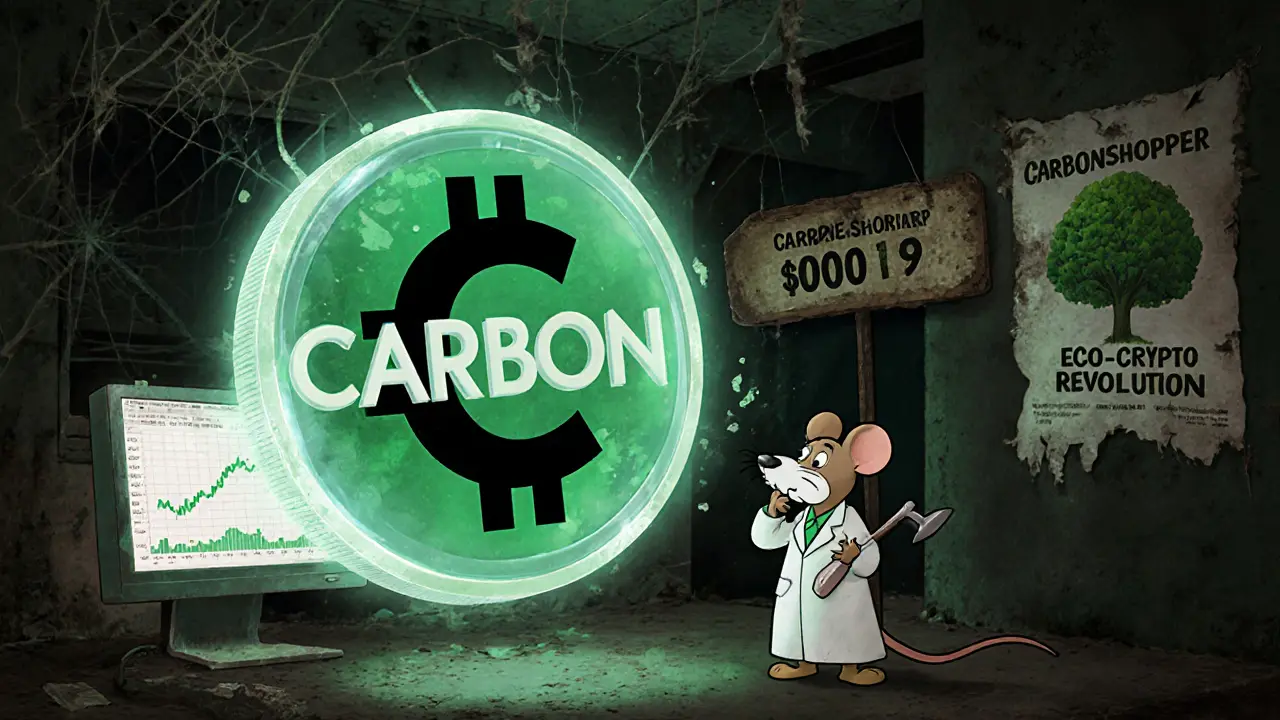What is Carboncoin (CARBON) Crypto Coin? Facts, Claims, and Reality
 Nov, 16 2025
Nov, 16 2025
Crypto Price Discrepancy Calculator
The Carboncoin article reveals 120x price discrepancies between exchanges. This tool calculates how much prices differ between two platforms.
High discrepancies like Carboncoin's (120x) typically indicate:
- Minimal liquidity (trading volume)
- Unreliable price data
- Potential market manipulation
- Lack of real market participation
Carboncoin (CARBON) isn't just another cryptocurrency. It claims to be a green alternative to Bitcoin - one that plants trees while you mine it. Sounds too good to be true? That’s because, for most people, it is.
What Carboncoin Says It Does
According to its official website, Carboncoin is a proof-of-work cryptocurrency launched in February 2014 with the mission to fund reforestation by using a tiny fraction of the energy Bitcoin consumes. It says it uses the Scrypt algorithm, works like Bitcoin, but removes "competitive mining" - a claim that contradicts how proof-of-work actually works.
The project promises something no other crypto has: unlimited funding for planting biodiverse forests. It claims that every transaction, every mined coin, and every holder contributes to planting trees - no matter what happens to the price. The website even mentions a tool called "Carbonshopper" to let merchants accept CARBON payments.
On paper, it sounds noble. But when you look past the marketing, the story gets messy.
The Numbers Don’t Add Up
Carboncoin says it has a total supply of 16 billion coins. As of late 2025, over 15.3 billion are already in circulation. That leaves less than 700 million coins left to mine - but here’s the catch: no one is mining them.
Trading volume? Reported as $0 across CoinMarketCap, Coinlore, and Coinbase. Zero. That means no one is buying or selling CARBON. Not even a few coins. If you tried to cash out your CARBON right now, you wouldn’t find a buyer.
Price data is all over the place. CoinMarketCap lists the price at $0.00119, with a market cap of $18.38 million. Coinlore says the same coin is worth $0.0000097 and has a market cap of just $149,500. That’s a 120x difference. One of these numbers is wrong - or both are manipulated.
Even Coinbase, a major exchange, lists CARBON with a price of $0.00119477 - but claims 0 coins are in circulation. How can a coin have a price if no one owns it? That’s not a glitch. It’s a red flag.
Is Carboncoin Actually Green?
Carboncoin markets itself as an eco-friendly crypto because it uses Scrypt instead of Bitcoin’s SHA-256. Scrypt is less power-hungry, sure - but that doesn’t make it green if no one’s using it.
More importantly, there’s zero proof that any trees have ever been planted. No photos. No partnership announcements with environmental groups. No receipts. No independent audits. No public ledger showing how much funding went to reforestation projects.
Compare that to real carbon-offset crypto projects like Climate Trade or Poseidon Foundation. They work with verified forestry programs, publish third-party reports, and tie token value to actual carbon credits. Carboncoin? Nothing.
Even worse, the project claims it’s "open source," but there’s no GitHub repository. No code commits. No developer activity since 2018. If it’s open source, who’s maintaining it? No one, apparently.

Why No One Talks About It
Look at the community. Reddit? No threads. Twitter? No official account. Discord? Silent. Trustpilot? No reviews. CryptoSlate? No mention. Even the most obscure altcoins have some chatter - people arguing, sharing memes, trying to pump them. Carboncoin? Crickets.
The last time anyone traded CARBON in any meaningful way was around 2018, when it hit an all-time high of $0.0025. Since then, it’s lost over 99% of its value. That’s not a dip. That’s a corpse.
And yet, the website still looks active. Still promoting "tree planting." Still offering "Carbonshopper." Still listing the same old stats. It’s like a museum exhibit - preserved, but not alive.
Carboncoin vs. Real Eco-Crypto Projects
It’s worth comparing Carboncoin to actual sustainable blockchains:
- Algorand uses pure proof-of-stake - uses 99.9% less energy than Bitcoin.
- Chia uses proof-of-space-time - no mining rigs, just unused hard drive space.
- Cardano is energy-efficient by design and funds environmental initiatives through its treasury.
None of these projects pretend to plant trees with every transaction. They focus on real tech improvements. Carboncoin? It’s a marketing gimmick wrapped in blockchain jargon.

Is Carboncoin a Scam?
It’s not illegal. It’s not hacked. It’s not a Ponzi scheme that collapsed overnight. But it’s also not a functioning cryptocurrency.
It’s a ghost project. A digital relic. A website that never updated its content since 2018, yet still tries to sell you on a dream. The team behind it vanished. The community disappeared. The market died. And the trees? Still not planted.
There’s no evidence of fraud - just total abandonment. The website remains online, probably because domain registration is cheap and no one bothered to let it expire. It’s a zombie coin: technically alive, but completely inert.
Should You Buy Carboncoin?
No.
Not because it’s dangerous - it’s not. But because it’s pointless. You can’t trade it. You can’t use it. You can’t earn from it. And even if you mined every last coin, you couldn’t cash out.
Buying CARBON is like buying a ticket to a concert that never happened. The venue is still there. The posters are still up. But the band left years ago.
If you care about crypto and the environment, look at projects with real tech, real transparency, and real impact. Carboncoin doesn’t deliver on any of those.
What Happened to Carboncoin?
It started with a good idea: use crypto to fund reforestation. But it never built the infrastructure to make it real. No code updates. No partnerships. No audits. No liquidity. No community.
It was a product of the early crypto boom - when anyone could launch a coin with a whitepaper and a website and call it a "revolution." Carboncoin rode that wave in 2014, got some attention, then faded into obscurity.
Today, it’s a cautionary tale. Not about fraud - but about empty promises. The crypto space is full of projects that overpromise and underdeliver. Carboncoin is one of the quietest ones.
Mike Calwell
November 17, 2025 AT 01:06carb0ncoin? more like carb0nghost lol
Sean Pollock
November 17, 2025 AT 16:26bro this is the ultimate crypto zen koan: if a coin is mined but no one trades it... does it even exist? 🤔🌱💸
also why does the site still have a "Carbonshopper" button? is someone out there buying socks with CARBON? i need to know.
Teresa Duffy
November 17, 2025 AT 23:32I remember back in 2015 when this was a tiny side project on Reddit. Everyone thought it was cute. Now it’s like finding a VHS tape of a movie that never got released. Still in the box, still has the sticker, but the tape’s all tangled.
It’s not a scam, it’s just... forgotten. And honestly? That’s sadder than any rug pull.
Jay Davies
November 18, 2025 AT 21:04It's worth noting that CoinMarketCap's listing of CARBON with $0 circulating supply but a market cap is technically impossible under standard financial accounting principles. This is not a data error-it’s a violation of basic metric consistency. The absence of a GitHub repository further confirms this is not an open-source project, but a static webpage with marketing copy.
Grace Craig
November 20, 2025 AT 09:42One cannot help but observe the profound irony of a cryptocurrency purporting to be an environmental savior while simultaneously exhibiting all the hallmarks of digital obsolescence. The absence of verifiable ecological outcomes, coupled with the total collapse of liquidity, renders its ecological claims not merely unsubstantiated, but aesthetically grotesque. A monument to performative virtue.
Shanell Nelly
November 21, 2025 AT 15:20if you want to support reforestation, just donate to One Tree Planted. they’ve planted over 40 million trees. CARBON? hasn’t planted one. not even a sapling.
you’re not helping the planet by hoarding a coin no one wants. you’re just keeping a dead website alive. 😔
Rebecca Amy
November 22, 2025 AT 07:04so... no one's mining it, no one's trading it, no one's even talking about it... but the site still says 'planting trees'? 🤨
maybe the trees are growing in a parallel universe?
Ninad Mulay
November 23, 2025 AT 14:53in India we have a phrase: 'jugaad' - fixing something with duct tape and hope. CARBON is crypto jugaad. no code updates? no team? no exchange? no problem! just keep the website live and hope someone believes in the dream.
we’ve seen this before with 'green' solar startups that never installed a panel. same energy. same vibe. just different jargon.
Darren Jones
November 24, 2025 AT 01:23Let me just say-I’ve seen a lot of dead coins. But this one? It’s like a ghost haunting its own tomb. The website is still up. The domain is paid. The logo still glows. But the soul? Gone.
And the worst part? Someone, somewhere, still owns a few coins. And they still check the price every day. Hoping. Waiting. Believing.
That’s not crypto. That’s heartbreak.
Aayansh Singh
November 24, 2025 AT 05:52the fact that you even wrote a 2000 word essay on this dead coin proves how desperate people are to find meaning in crypto garbage. CARBON is not a project. It’s a tax write-off for a guy who bought a domain in 2014 and forgot to cancel it. End of story. Move on.
Laura Lauwereins
November 25, 2025 AT 12:17so the trees are planted... in the marketing department? 🌳💸
you know what’s greener than CARBON? Turning off your computer. Or better yet-donating $5 to a real reforestation org. You’d do more for the planet than holding 10,000 CARBON coins for the next 10 years.
Astor Digital
November 27, 2025 AT 11:35my dad still has a USB drive with 200 CARBON coins he mined in 2015. he says it’s his "eco retirement fund."
i told him if he ever sells them, he’ll be the first person in a decade to cash out. he just smiled and said, "it’s the thought that counts."
...i cried a little.
Carol Rice
November 28, 2025 AT 23:52THIS IS WHY WE CAN’T HAVE NICE THINGS.
Somebody had a good idea. Then they got lazy. Then they stopped caring. Then they left the website up like a tombstone with a smiley face.
It’s not even a scam-it’s a betrayal of hope. And that’s worse.
Carol Wyss
November 29, 2025 AT 18:24you know what’s wild? The fact that this post exists means someone still cares. And maybe that’s the real tragedy. We’re not mourning a coin. We’re mourning the idea that someone once believed they could change the world with code and good intentions.
It’s okay to let it go. But it’s also okay to feel sad about it.
Ryan Hansen
December 1, 2025 AT 05:55Let’s be real for a second: Carboncoin isn’t a scam because scams require intent to deceive. This feels more like a case of benign neglect. Someone built it, got excited, maybe even planted a single tree with their own money, then got distracted by the next shiny thing. The website? It’s still there because domain renewals are cheap and no one had the heart to delete it. The code? Frozen in 2018. The community? Ghosted. The trees? Still imaginary. It’s not evil-it’s just... empty. Like a house with all the furniture gone but the lights still on. Someone used to live here. Now? Just echoes.
Derayne Stegall
December 2, 2025 AT 13:36if you still believe in CARBON... i got a bridge to sell you 😎🌳💰
Kathleen Bauer
December 3, 2025 AT 13:37i found a wallet with 500 CARBON coins in an old laptop. i didn’t even know what it was. looked it up and felt weirdly guilty for holding it.
so i sent it to a crypto charity that actually plants trees. felt better. maybe you should too.
Nidhi Gaur
December 5, 2025 AT 10:26everyone is overthinking this. CARBON is not a coin. it’s a meme. a cautionary tale. a digital fossil. the real story is how easy it was to make people believe in magic with a website and a green logo. we were all just waiting for the next miracle. turns out the miracle was just a typo away from being a scam
Student Teacher
December 6, 2025 AT 08:47why does this feel like a lesson in digital archaeology? we’re digging through the ruins of early crypto dreams, trying to understand what went wrong. Was it bad tech? Lazy devs? Or did we just want to believe too hard? I’m trying to figure out if this is a failure of engineering-or of human hope.
Gaurang Kulkarni
December 6, 2025 AT 15:36carboncoin is a dead coin with a website that still works and a market cap that makes no sense and zero trading volume and no devs and no trees and no one cares so why are you even reading this